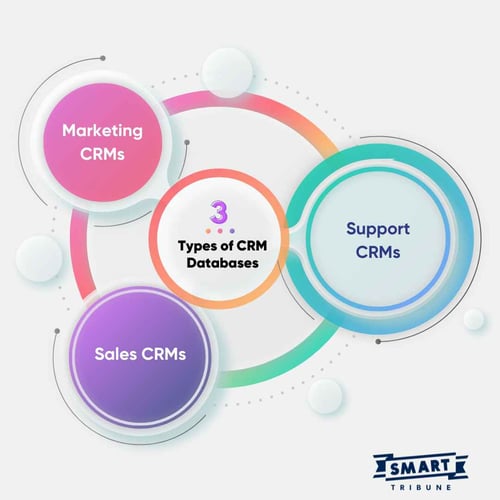
CRM is the acronym for Customer Relationship Management. The philosophy of a CRM is simple: putting the customer first. This allows your agents to record information from all their interactions with customers and prospects and to follow the evolution of sales opportunities. The benefits? A better customer experience ultimately growing loyalty for your business.
In this article, we will explain to you exactly how a CRM works, as well as detail the different types of CRM databases that exist so that you can understand which is best adapted to your organisation.
Table of content:
How does CRM database work? Definition and presentation
Let’s take a look at the role that a CRM plays in centralizing, managing and automating client data.
What is a CRM database? Defining Customer Relationship Management software
A CRM database is a technology that allows the management of all relations and interactions between a company, its customers and prospects. The main goal is to improve commercial relations in order to grow sales. CRM software helps brands stay connected to their customers by simplifying the marketing and sales processes, which in turn, improve the company’s profitability.
When referring to a CRM, we’re generally talking about a CRM software that’s a tool for the management of contacts and sales, and one that improves the productivity of marketing and sales services. CRM tools allow for the better management of the full lifecycle of customer and prospect relations.
CRM to support a “customer-centric” strategy
A customer relations management system supports a strategy that puts the customer at the center of everything. This customer-centric strategy must be based on clear goals when it comes to customer experience.
Each time a customer comes into contact with your company, no matter the channel, they have the opportunity to form an opinion, whether positive, negative or indifferent. With time, this sum total of customer experiences creates an image in the customer’s mind, which in turn, constitutes your brand image and its values.
Companies that take their CRMs seriously plan and maintain high-quality customer experiences because they recognize that a bad customer experience is a step towards losing customers, while a good experience encourages loyalty.

Centralization of customer data thanks to your CRM database
CRM software assembles all information related to sales, marketing and customer services in a central database.
92% of companies collect data on their prospects and customers, access to centralized data and storing it in a colocation data center helps reduce the number of silos in your organization, which will help you focus on the customer.
The customer information includes, but is not limited to phone numbers, addresses, and last point of contact. The software also records what was discussed, the dates of follow-ups, and even the status of an open ticket. It is important to note that the collection of this information must conform to GDPR laws.
All this information can be used to manage, measure and follow marketing, sales and support service for customers. Overall, this can strengthen customer loyalty and improve customer experience.
All employees have the same access to customer information, giving you a complete 360° view of the customer.
Automate sales processes via your CRM tool
All CRM processes begin with a lead: the name of a person you think you might be able to sell to.
In general, this person completes a web form (often from gated content) and provides you with their contact information.
Once the prospect is entered into the system, the software guides them to the sales process. It’s the CRM that alerts the seller to call a prospect at a certain time. Every time you interact with a prospect, you save the information in the CRM system. The same goes even if another stakeholder interacts with the same prospect.
In short, the CRM keeps track of all actions related to the prospect and of what was said.

At the same time, the CRM is a library of documents, calls and emails. Once an interaction with a prospect is initiated, you’ll get an instantly and automatically generated communication channel. Since the information is centralized, anyone within the company can help this person.
Whether you’re in sales, marketing or customer service, a CRM database can help you automate the individual sales process as well as the way in which all the processes work together. But it goes without saying that each company process has to be well-defined and efficient in order for the company to get good results.
The 3 main types of CRM databases for customer relations
Not all CRMs have the same functions. Based on your commercial goals, you may only need one set of sales, marketing and customer service tools in order to succeed in customer relations.
Here’s a preview of how CRM solutions can support your various needs.

Marketing CRMs
Successful marketing campaigns rely on the data of potential and existing customers in order to create smarter strategies and establish better commercial relationships.
Marketing CRMs allow you to collect and store data in a system, all while tracking information from various points of contact in your customer journey.

When potential customers participate in your marketing campaigns via forms, blog articles or emails, you can easily identify models for purchasing and behavioral trends. This allows your marketing team to respond more precisely to the needs of potential clients, personalize their experience and increase the number of new customers.
The main benefits:
- More efficiently reach your public target audience
- Generate higher quality leads
- Optimize your outbound campaigns, and not with a sole focus on SEO
Sales CRMs
While a marketing CRM provides tools to attract, engage and maintain relationships, a sales CRM focuses on conversion and generating contracts.
As customers get closer to making a purchase, having the right tools available helps your team stay on top of sales opportunities without losing sight of anything.
Sales CRMs are designed to provide estimates, track performance and organize activities. They also provide your sales teams with a centralized platform for managing time, automating manual tasks and getting feedback in real-time.
Companies that use a sales CRM can also forecast their revenue with more precision by analyzing value, estimated closing dates and the probability of closing a contract all throughout the sales pipeline.
The main benefits:
- Providing real-time information on customer activity and sales.
- Creating a database that manages and tracks transactions.
- Improving pipeline performance and the precision of forecasting.
Support CRMs
The management of customer relations requires interactive tools to treat complaints, resolve problems and ensure the efficient follow-up of any issues.
Support software like Smart Support includes a ticketing system that allows for the easy management of customer requests. These demands, whether via email, phone or on social networks, are recorded and organized in a centralized way in a CRM database.
In order to offer efficient customer assistance, a dedicated CRM makes teams better equipped to offer flawless customer service, thanks to, for example: a contact database or assistance via live chat with automated responses.
The main advantages:
- An all-in-one ticketing system to track, communicate and resolve customer requests.
- A CRM database to align your support team’s actions, using automated responses for a flawless user experience.
- Providing autonomous self-service support, 24/7, thanks to a resource center or e-learning.
Based on your immediate goals and needs, a complete CRM may not be necessary. That said, by providing your marketing, sales and customer service teams with adequate tools, you allow them to offer a better experience to your existing and potential customers.


.png)



